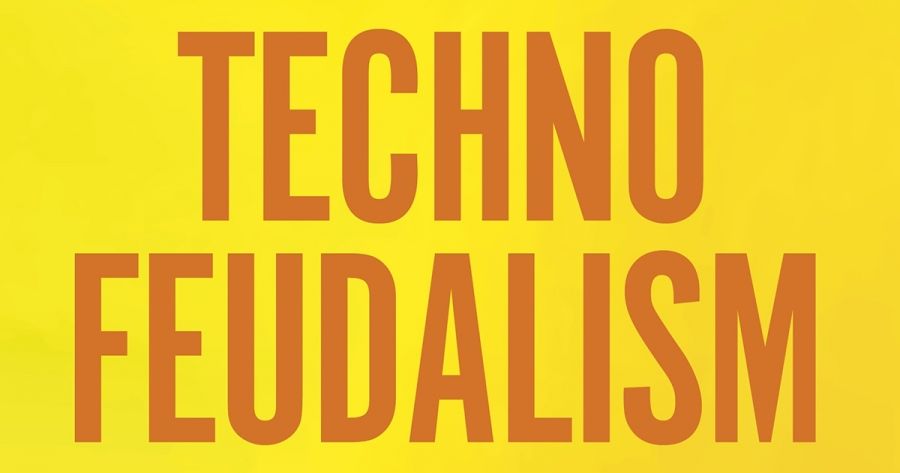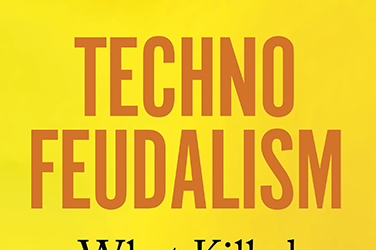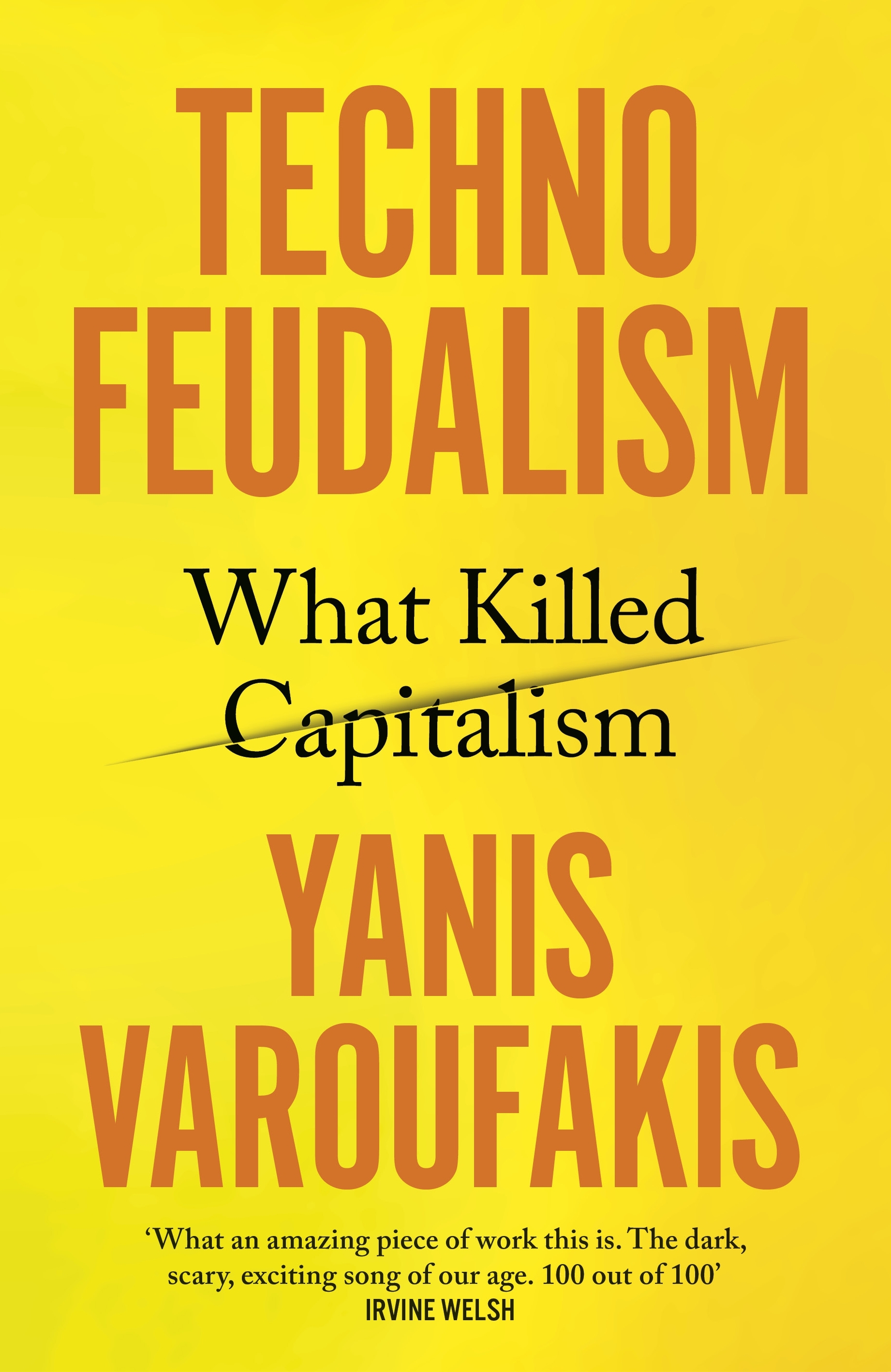
- Free Article: No
- Contents Category: Economics
- Review Article: Yes
- Article Title: 'A far, far uglier reality'
- Article Subtitle: Grace under technofeudal pressure
- Online Only: No
- Custom Highlight Text:
In Technofeudalism: What killed capitalism, Yanis Varoufakis wrestles with questions which are giddying in their significance. Do the profound changes we see taking place around us now, in our digital age, amount to a fundamentally new form of society? If so, what kind of society is it? And what, if anything, should we do about it?
- Featured Image (400px * 250px):

- Alt Tag (Featured Image): Nathan Hollier reviews 'Technofeudalism: What killed capitalism' by Yanis Varoufakis
- Book 1 Title: Technofeudalism
- Book 1 Subtitle: What killed capitalism
- Book 1 Biblio: Bodley Head, $36.99 pb, 282 pp
- Book 1 Cover Small (400 x 600):

- Book 1 Cover (800 x 1200):

Even the largest conventional capitalist operations, such as oil companies, must use and pay for access to servers, which Varoufakis sees as analogous to the land commons of pre-capitalist feudal society: ‘large or small, powerful or otherwise, all [these] vassal capitalists are by definition dependent to a greater or lesser extent on selling their wares via an ecommerce site, whether Amazon or eBay or Alibaba, with a sizeable portion of their net earnings being skimmed off by the cloudalists they depend on’.
Rentiers, including the technofeudalist variety, have little incentive to invest in business competition, and so we can expect our current, depressed economic conditions to remain the norm: ‘rent is stashed away in property (mansions, yachts, art, cryptocurrencies, etc.) and stubbornly refuses to enter circulation, stimulate investment into useful things, and revive flaccid capitalist societies’.
An increasing number of waged workers, subject to dehumanised profit-maximising management algorithms that reward and punish them, become ‘cloud proles’. And the rest of us, with our smartphones, apps, and our use of a dramatically proliferating set of products connected to the cloud, are ‘cloud serfs’, freely giving up our data and personal identities to cloudalists, who sell that data on, further entrenching their social dominance, and at the same time use this data to offer us products attuned more and more to our tastes, until it is actually the cloudalists, not us, who decide our tastes.
This serfdom is the ‘crux’ of the cloudalists’ power. Where labour costs account for around eighty per cent of any major conglomerate’s income, Big Tech’s workers collect less than one per cent of their firms’ revenue: ‘The true revolution cloud capital has inflicted on humanity is the conversion of billions of us into willing cloud serfs volunteering to labour for nothing’ to produce what is truly valuable within cloud capital, namely content.
Whereas in previous generations, ‘however hard one had to work, you could at least fence off a portion of your life, however small, and within that fence remain autonomous, self-determining, free … [f]or young people in today’s world, even this small mercy has been taken away. Curating an identity online is not optional, and so their personal lives have become some of the most important work they do.’
In this environment, markets cease to exist and profits to matter in any meaningful sense. Grotesque (the strongest word I can think of, but still inadequate) inequality expands exponentially. A report by Swiss bank UBS found that billionaires increased their wealth by more than a quarter between April and July 2020.
Technofeudalism heralds a new cold war, between the United States and the only country with sufficient cloud resources and cloud-based innovations of its own to potentially raise a challenge to US global hegemony. In a fascinating chapter, Varoufakis notes the irony that the survival of democracy depends on ‘the only political force that can do anything to keep the cloudalists in check’: the Chinese Communist Party.
Applying correct terms for what exists is not incidental, Varoufakis insists, noting that the bold use of ‘capitalism’ when feudalism still existed everywhere, ‘opened humanity’s eyes to the great transformation unfolding around them as it was happening’. Moreover, as Simone Weil argued, when a word is properly defined it can help us ‘to grasp some concrete reality or concrete objective, or method of activity’ in a way that no other term can.
Technofeudalism, here, is the product of two key developments: first, governments’ facilitation of the privatisation of the internet, originally conceived of as a public space; and secondly, the response of the world’s central bankers to the global financial crisis of 2008, which was to socialise banking losses and effectively reward criminal banking management while, at the same time, imposing austerity on ordinary people. Big business, realising that consumer spending power was limited, declined to invest, and economic growth tanked. Central bank cash, which displaced profit and now remains the engine of the world’s investment and innovation, was of greatest use by far to the cloudalists, who bought server farms, fibre optic cables, artificial intelligence laboratories, warehouses, software development and engineering: ‘between 2017 and the beginning of the pandemic, loss-making cloudalist companies saw their share value rise by 200 per cent’.
What then, to put Lenin’s famous question, is to be done?
The final chapter of the book is as inspiring as some earlier chapters are depressing. Inspiring not so much because one believes in the ‘cloud mobilization’ that Varoufakis sets out is probable, or even necessarily possible, but because he has had the courage, strength of will, and grace under technofeudal pressure to set out, clearly and intelligently, how we might radically democratise our society and realise a better world: ‘To own our minds individually, we must own cloud capital collectively.’
Technofeudalism is addressed throughout to Varoufakis’s much-loved, recently deceased father, a steel industry worker from whom he learned foundational lessons about the nature of the physical and human worlds and to whom he is determined to explain, here, capitalism’s fate.
If the lessons Varoufakis learned from his father have not entirely freed him from mistaken historical notions, such as that the Soviet Union had something to do with the project of human liberation, they have certainly freed him from the abstractions and delusions of those, such as the world’s central bankers, corporate capitalists, and megalomaniac cloudalists, who would end the world before agreeing to share it.


Comments powered by CComment